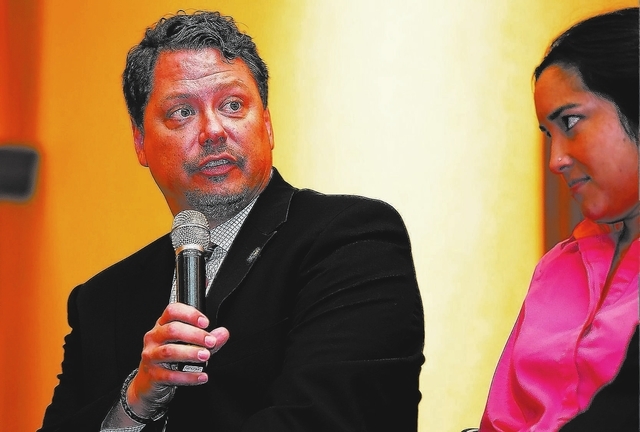Education debate kicks off Review-Journal’s policy luncheon series

Millions of dollars funneled to support English language learners, the state’s new Common Core standards and a new mandatory teacher evaluation system were what experts debated Monday during a community conversation about education.
The event — “Schools in Session,” which took place at Texas Station — was the first in a monthly Hashtags &Headlines policy luncheon series sponsored by the Review-Journal.
Monday’s event featured a panel discussion with Pat Skorkowsky, the Clark County School District superintendent; Alexis Gonzales-Black, a member of the state Board of Education; and Seth Rau, policy director for Nevada Succeeds, a statewide organization that focuses on achievement.
It will take two years to see what difference is made by the $39.4 million being spent to provide additional support to English language learners in Clark County, Gonzales-Black said. The county’s share of the funding will be distributed among 14 elementary schools, referred to as “zoom schools,” over the next two years.
Skorkowsky said officials will focus on increasing the achievement of those schools.
There’s no easy answer as to how to best help English language learners succeed, Gonzales-Black said. But addressing the issue shouldn’t only be seen as a “challenge to be met or to be dealt with,” she said.
“We have an incredibly diverse body here,” she said. “Instead of just pushing to assimilate … how can we tap into this … resource and potentially produce a bilingual workforce?”
Panelists also discussed the state’s Common Core standards, which they said will change the way students are taught and the way they learn. Nevada has set a new bar that requires the percentage of students with grade-level skills to increase from 50 percent to 90 percent by the 2016-17 school year. The state adopted the Common Core standards to reach that goal.
Almost all states use the Common Core.
Nevada will get rid of the state’s standardized tests for new ones based on the Common Core standards, which the state will pilot in 2013-14 and implement the following school year.
This will be a very important change, but thus far, only a third of Nevada parents know what the Common Core standards are, Gonzales-Black said.
“This will change the level of rigor,” she said, adding that the new standards also will teach students how to be better critical thinkers.
Students need to know how to do more than simple memorization or filling in the blanks, Gonzales-Black said. The shift will be difficult, but Nevada is taking a step in the right direction, she said.
One of the biggest challenges will be creating the test, Rau said. It will be a harder and more expensive test to develop, he said. Still, he said it will be a good investment.
Skorkowsky said that because the assessments are changing, officials need to change the way students are taught in the classroom.
Students need to be able to read an article and compare it to another source to make an informed opinion, he said. They need to be able to compare and contrast and defend their opinion.
“And that’s what the Common Core standards will do,” Skorkowsky said.
That’s not the only big change the fifth-largest school district in the nation is gearing up for. Teachers will soon be evaluated under the state’s first mandatory teacher evaluation system.
The evaluation system pilot began this year for 10 percent of the state’s teachers and principals.
“I think the challenge is the unknown,” Skorkowsky said. “Unfortunately, we are at a point in our state where there’s still a lot of unknowns.”
One challenge is how to deal with accountability to make sure that is fair and equitable, Skorkowsky said.
“That’s been a challenge across the nation,” he said.
English, language arts and mathematics scores will be used for the teacher evaluations. But only about 30 percent of Clark County School District teachers teach English, language arts and math, Skorkowsky said.
“There’s the other 70 percent that don’t directly have impact on English, language arts and mathematics scores,” he said. “And how do you apply the system fair and equitable across the board? And that’s part of the challenge.”
The state is trying to figure out how to accurately gather data on the 70 percent of nontested subjects. The way it currently stands, the evaluation of teachers who teach nontested subjects will be calculated on the average of the rest of the school, Gonzales-Black said.
Next month’s event, “Downtown’s past and future: A discussion with the man who started the downtown revolution and the man who’s keeping it alive,” is scheduled to take place Oct. 21. It will feature former Las Vegas Mayor Oscar Goodman and Zappos founder and CEO Tony Hsieh.
For information on the policy luncheons, contact Melissa McCabe at the Las Vegas Review-Journal, 702-383-0469.